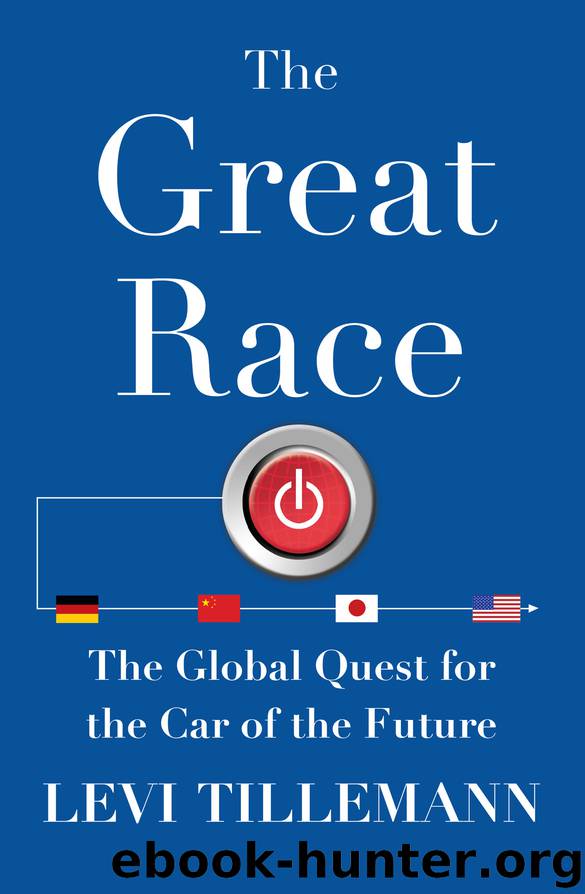The Great Race by Levi Tillemann

Author:Levi Tillemann
Language: eng
Format: epub
Publisher: Simon & Schuster
“Halftime in America”
The stimulus was an enormous opportunity. The Obama administration used its unique moment of leverage with the industry to push through a program of aggressive automotive industrial policy. But these policies were, of necessity, hastily planned. They were open to accusations of clientelism and heavy influence from Washington lobbyists. Yet, for all its flaws, the Obama program represented the possible beginnings of a new industrial strategy for the United States. Whether or not these programs would be allowed to continue depended largely on the outcome of a national dialogue that would culminate in the presidential election of 2012.
Both sides of this debate were unwittingly presaged by an intense, gravelly voice, stepping out from a dark, forbidding alley, on a cold winter night in February 2012. “It’s halftime,” the voice said. “Both teams are in their locker room discussing what they can do to win this game.” As the camera angle panned left, a long shadow drifted forward. “It’s halftime in America, too,” Clint Eastwood told a rapt audience of 100 million Americans watching the 2012 Super Bowl.
Chrysler, which had just survived America’s economic catastrophe through Uncle Sam’s firm hand-holding, wanted to send a message: it was strong again, it was ready to roar back. Amidst the rat-tat-tat roller-coaster ride of thirty-second slapsticks, Chrysler’s “Halftime in America” stretched on for what seemed like an eternity—two minutes. It culminated in an impassioned, unmetered, patriotic rap and battle cry for American resurgence. “This country can’t be knocked out in one punch. We get right back up, and when we do, the world’s gonna hear the roar of our engines,” Eastwood assured an audience still reeling from the effects of the Great Recession.
It was potent stuff.
But the spot was roundly criticized by Republicans and Fox News as a not-so-subtle endorsement of the Obama administration—by both Chrysler and Eastwood himself. It was a controversy that probably would have died in a few weeks, except for Eastwood’s next foray into U.S. politics seven months later—this time very much intentionally at the Republican National Convention.
Hailed as a secret weapon by Republican strategists, Eastwood emerged onto the convention stage into a sea of red, white, and blue. The audience was smaller than at the Super Bowl, but it was broadcast to a politically pivotal demographic of 30 million Americans obsessed with politics and U.S. elections.
Eastwood shuffled out with a bit of a smirk, carrying an unexplained empty chair. Rather than staying on script, he decided to improvise a profane, slapstick chastening of President Barack Obama—using that empty chair as a stand-in.
“What? What do you want me to tell Romney?”
“I can’t tell him to do that . . . he can’t do that to himself. You’re absolutely crazy.”
Slack-jawed political analysts watched, aghast at the spectacle taking place just minutes before Mitt Romney himself was scheduled onstage. It was, without doubt, the single indelible moment of a largely forgettable Republican convention.
Beyond the Kafkaesque quality of his monologue, Eastwood’s appearance underscored a serious point: if Obama was reelected, it
Download
This site does not store any files on its server. We only index and link to content provided by other sites. Please contact the content providers to delete copyright contents if any and email us, we'll remove relevant links or contents immediately.
Learning SQL by Alan Beaulieu(6291)
Weapons of Math Destruction by Cathy O'Neil(6280)
Digital Minimalism by Cal Newport;(5765)
iGen by Jean M. Twenge(5416)
Sapiens by Yuval Noah Harari(5371)
The Age of Surveillance Capitalism by Shoshana Zuboff(4293)
Elon Musk by Ashlee Vance(4127)
Thing Explainer by Randall Munroe(3941)
Apollo 8 by Jeffrey Kluger(3709)
Future Crimes by Marc Goodman(3600)
The Science Book (Big Ideas Simply Explained) by DK(3287)
The Innovators: How a Group of Hackers, Geniuses, and Geeks Created the Digital Revolution by Walter Isaacson(3210)
Who Can You Trust? by Rachel Botsman(3133)
I Live in the Future & Here's How It Works by Nick Bilton(2997)
Infinite Energy Technologies by Finley Eversole(2985)
Steve Jobs by Walter Isaacson(2899)
Dawn of the New Everything by Jaron Lanier(2772)
Chernobyl by Serhii Plokhy(2538)
Ben Franklin's Almanac by Candace Fleming(2531)
